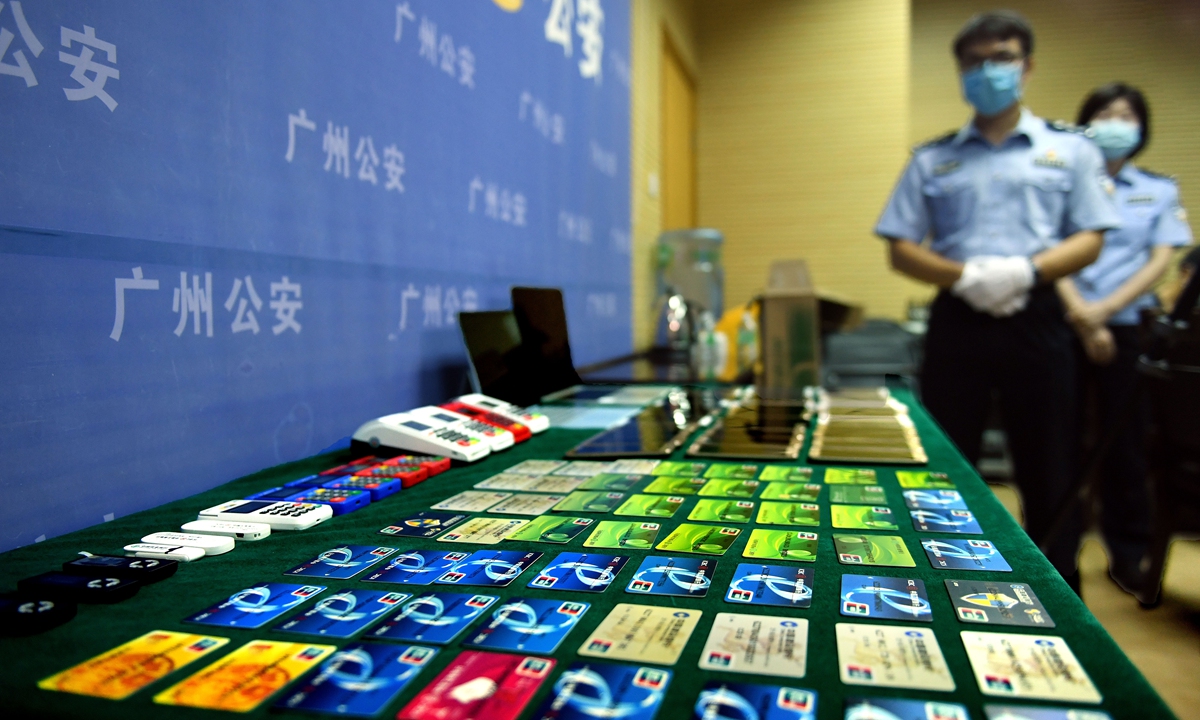
Police officers in South China's Guangdong Province on Monday display mobile phones and bankcards they seized from an internet fraud ring. The police spent six months tracing and destroying the ring, whose members had hidden in South China's Hainan Province and Southwest China's Sichuan Province. Photo: cnsphoto
China's legislation draft seeks to list people related to telecommunication fraud into its social credit system, and increase punishment for people involved in such fraud, as the government's newest effort in clamping down rampant telecommunication-related fraud.
The Standing Committee of the 13th National People's Congress (NPC), China's top legislature, began its 36th session on Tuesday to review multiple draft laws and revisions. Lawmakers will review a draft law pertaining to telecommunications and online fraud, among other reports and bills.
Yang Heqing, a spokesperson for the Legislative Affairs Commission of the NPC Standing Committee, said at a press conference on Friday that the new draft will increase punishment for people involved in the telecommunication fraud, and list them into China's social credit system, so to take punishment measures accordingly.
Serious violators of the social credit system could be banned from taking trains and flights.
The draft also emphasized educating elderly and children, who are most easily lured by such fraud; and urged rewards systems for reporting such fraud.
Data from the Ministry of Public Security (MPS) said in May that telecommunication fraud has became the most reported, and most frequently occurred crime in China.
The authority's data showed that as of November 2021, more than 370,000 telecom and network fraud cases have been cracked nationwide and more than 326.5 billion yuan ($47.26 billion) was intercepted. In some major cities, telecom fraud cases account for more than 50 percent of criminal cases.
Xiang Ligang, director-general of the Information Consumption Alliance, an industry association, told the Global Times that since China has been taking a severe attitude toward telecom fraud crackdowns, a large number of telecommunications and network fraud dens in the country have been transferred overseas.
However, due to the cost of cross-border law enforcement, it's not easy to rope in criminals and retrieve property loss of victims, which makes cooperation between China and other countries in tackling this kind of crime so urgent, Xiang said.
Recently, the case of some residents in the island of Taiwan being forced to join online gambling, telecommunications fraud and other illegal activities has brought the topic of overseas telecommunication fraud back to public spotlight.
The Chinese Embassy in Cambodia has so far received more than 20 requests for help from scam victims from Taiwan island and successfully assisted the Cambodian government to save some of them, said the Chinese Foreign Ministry on Monday.
Xiang said that due to difficulty of obtaining evidence, and of coordinating with law enforcement departments overseas, it is relatively challenging for China to track down overseas telecommunication frauds den outside of the country. Yet experts pointed out certain achievements have been made since China and other countries have stepped up efforts in this front.
Sun Maoli, an official from the MPS, said at a press conference on July 25 that China is striving to push forward international cooperation to tackle this problem, including sending work groups to Southeast Asian countries, and Middle East, which helped sent nearly 1,000 suspects back to China.
In May this year, telecom operators in Zhejiang and Henan provinces gave options to users if they would like to block calls from overseas in a bid to protect them from becoming victims of rampant cross-border telecom frauds.
Zhu Haoning also contributed to this story

